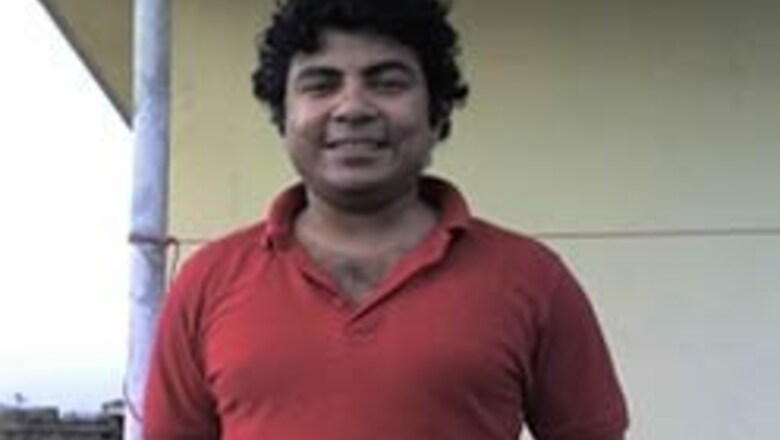
views
Theatre personality Murtaza Danish Husain answers queries on Indian theatre over the ages, the art of story-telling and the future of actors.
Jhoomur: With multiplexes galore and movies releasing a dime a dozen, does theatre really have a scope in India? How big or small can/will things get?
Murtaza Danish Husain: Yes, theatre has scope. It will always have. And of course this eternal tussle between cinema and theatre will remain. But you can't have the same meal every day. So, theatre is not going to be out of fashion for sure.
Naseeruddin: How difficult it is to build perfect body for stage?
Murtaza Danish Husain: Hello Naseeruddin. Perfect body? I didn't get it bro. We're in theatre not wrestling :)
Naseeruddin: Why you are named after pastry?
Murtaza Danish Husain: My name is Persian word meaning "wisdom". I spell it the way Danes do.
Naseeruddin: How can I learn to act like you?
Murtaza Danish Husain: Well, I don't claim to be a great actor, Naseeruddin. There are more worthy names like your namesake. Acting is more like observing. You need to be a keen observer in order to portray those characters on stage.
Jayant: Does theatre give you enough for your daily bread?
Murtaza Danish Husain: Well theatre definitely doesn't pay you enough to sustain, especially when you're an actor. But I guess if you produce it, and be more like a technical support like a light designer, it may just pay you comfortably.
Eve: Acting for love or acting for money? And what's your take on actors who dance at weddings for money? Would you do it?
Murtaza Danish Husain: Well I think it's like fine balancing between your passion and your needs. At times one may have to accept assignments where one does it for money. We all need to live. Dancing at a shaadi is like performing. Someone wishes to do why not? We all perform in our private get togethers, somebody is just charging for it.
Arun Balaji: Could you please tell me the ways in which one could develop the art of story-telling.
Murtaza Danish Husain: To begin with one needs to have a good ear. You must be enjoying those stories. And when they become a part of you, narrating them becomes easier. It's like a joke you love to tell, it automatically comes to you to deliver it with panache.
Hindole: You are one of India's famous actors. What tips do you have for those following in your footsteps?
Murtaza Danish Husain: Really! I didn't know that Hindole. I am just another struggling actor looking for good meaty roles. Thanks for the praise. Well, just get under the skin of your character. :-)
Anonymous: Why are dramas not advertised as films are?
Murtaza Danish Husain: Because we do not have those kind of resources. If we did, we'd advertise like films too.
Pallav Nayak: Actors do intelligent roles in theatre but dumb ones in films, TV. Does this break their hearts?
Murtaza Danish Husain: Well not all of them. And sometimes actors have a problem adjusting to a new medium. Stage requires a bigger persona than what the actor have. Camera requires you to be realistic. Some actors are not able to adapt. But that doesn't mean we can extend you're statement to every actor.
Vikram: Who will watch a three hour movie in the near future, in this changing world?
Murtaza Danish Husain: Everyone. If it is good.
Azad: Why are they are copying Hollywood?
Murtaza Danish Husain: Hey Azad I think you meant "why are they..." and they I presume is Bollywood. Well, lack of original ideas. Simple. But once in a while we do get something worthwhile. :-)
Jayashree: How good are you?
Murtaza Danish Husain: Jayashree that's tough to answer. I am still at the drawing board discovering myself.
Jhoomur: Tell us more about Dastangoi and story-telling, what compelled you guys to 'revive' it?
Murtaza Danish Husain: Dastangoi is a form of storytelling. When the tradition was alive, 150 years back, Dastangos were impromptu creating tales as they were performing. These were fantastical tales of magic and tilism, fairies and goblets, etc. When we perform these tales now, people are wonderstruck that we had such rich imagination and literature in India before Tolkien or Rowling could even dream of it. Mahmood Farooqui was the one who actually revived it. I joined him later.
Pankaj: In Pakistan, theatre is king but India it's almost dying? Why?
Murtaza Danish Husain: That's not true. Theatre is alive and kicking in India and is far more diverse, rich and varied in India. We have a stronger tradition of theatre in our country. Pakistan is a new state. Just 60 years old. They're still grappling with basic identity issues.
Sim: Which play have you done?
PAGE_BREAK
Murtaza Danish Husain: Many sim. To name a few Agra Bazaar, Jaat Hi Poocho Sadhu Ki, Panchi Aise Aate Hain, A Cat on A Hot Tin Roof, The Crucible, Arms and The Man, etc. And Rumi and Mirzabagh in recent times.
Eve: Was there any difference in the reaction that you received for your Dastangoi performances in Pakistan and India? Where was the audience more receptive?
Murtaza Danish Husain: Now I think of it, the response was similar. I guess urban audience is low on cultural input. So in Pakistan too people were equally awestruck that we have such a heritage and we're unaware. Just that the older generation was better versed with the Dastan traditions.
Jagdeep Singh: There are hundreds of really remarkable stories to be told from our country. We have a great history. I would really be inspired to see movies like Rang de Basanti, which was Inspired by true Incidents. I like movies like Black Friday and Parazania -- movies that have some substance. I don't say that Indian cinema should stop making romantic or masala movies, but I think they should change their style of story telling asking them to show something different.
Murtaza Danish Husain: I agree with you Jagdeep. And I think it is happening. We are changing. You've mentioned a few yourself.
Jagdeep Singh: I always wonder why people here in India like to see the same love story again and again. The main thing I like about Hollywood is that their movies are mainly based on true incidents or inspired by true incidents. Whereas in Indian cinema, we tend to like people running around trees singing songs or ladies baring their body to attract viewers! Is Indian cinema ever going to grow up?
Murtaza Danish Husain: Well may be we're a fatalistic society and anything that makes us escape our grind is welcomed. But on a different note, I think industry is realising that the audience is changing and now we're getting films of all sorts.
S Praveen: What's the difference between the actors performances in Kollywood and Bollywood?
Murtaza Danish Husain: My knowledge of Bengali cinema is zero except that I am aware of few of the legends. I won't be able to answer this.
Durai: Why is Hindi cinema giving so much importance to only Urdu and not other languages?
Murtaza Danish Husain: On the contrary Durai, I think Hindi cinema has degraded every language and neglected it. Look at the quality of dialogues you had 40-50 years back. Some of it was literature. You had people like Rahi Masoom Reza penning the scripts. These days we hear a language which is neither Hindi nor Urdu.
Durai: Why are people always encouraging Muslim actors?
Murtaza Danish Husain: I don't think anyone consciously encourages Muslim actors. People encourage good actors. It is coincidental that some of them happen to be Muslims. But your question makes me wonder where you're coming from?
Name: I love theater, but of late I have noticed that very few people are interested in it. I always manage to find friends to watch movies with me, but when it comes to theater, it's often hard to find friends. Do you agree that this is the current situation of theatre? This being the current situation don't you think it would be better to make movies, so that it would reach a larger audience?
Murtaza Danish Husain: Dump your friends. Well, theatre is like any other industry. You have good theatre, you have bad theatre, you have boring theatre too. Just like cinema. It's about keenly following theatre. And soon you'd know who are the better ones and which ones are the better plays, and theatre going will never be a sad experience.
Eve: Indian theatre, it's either crying, preachy or slapstick -- comments, agree/disagree?
Murtaza Danish Husain: Well, that means you're not watching good theatre and definitely not my plays.
Eve: We have also heard you are a poet. When do we see Danish the poet on stage?
Murtaza Danish Husain: You see Danish the actor, even when I am performing my poetry.
Eve: What's the one role you will give an arm and a leg for?
Murtaza Danish Husain: Gabbar Singh. Someone even said once that I resemble Amjad Khan and I was flattered.
Test: Does it not go this way? Dream of any acting professional - 1) Films - did not work? 2) Small Screen - did not work? 3) Theater. Is it not true that actors have the least preference for theater these days? Most of them try for movies and TV soaps and if nothing works they land up in theater?
Murtaza Danish Husain: I think you've got the other way round. Most actors begin with theatre and graduate to films. And let me tell you any serious actor worth his name would prefer theatre any day over any other medium. You'd be surprised all serious actors are majorly into theare - Naseer, Boman, Rajat Kapur, etc.
Test: Yes, that is because Naseer, Boman, Rajat Kapur, etc. never got a direct break in movies. But given a chance I'm sure they would have chosen films over theater. It's just that theater gave them a good break. And the fact that they left theater for films, clearly shows the preference. If u were given Rs 1 crore for a film, would you not jump at the chance and do it rather than theater?
Murtaza Danish Husain: You're mistaken my friend. Naseer and Boman even when acknowledged as great actors and with regular work still atively to theatre. In August second week, Naseer is performing Dear Liar in Delhi at Kamani for Can Support. Go and ask him the same question.
Neeraj: Why is there lack of options/information for the people who want to join theatre at initial level?
PAGE_BREAK
Murtaza Danish Husain: There are not lack of options Neeraj. There are many. What I agree is there is lack of information because it is financially not a rich industry. Information dissemination is poor. But if you be a little proactive you'll find the information. You need to understand where to look for it.
Eve: There is fantasy again. Why is it that any story-telling has to be fantasy? Is it a case of real people being scared of reality and therefore seeking respite in fantasmia?
Murtaza Danish Husain: Of course not. Dastan is fantasy but if you read Manto or Premchand, or Ismat Chughtai they're not fantasy. Their stories are hard naked unpleasant realities staring at you.
Eve: Hindi, English, Urdu: what's your preferred language of performance and why?
Murtaza Danish Husain: I prefer Hindi and Urdu. I think we best express in our own language. Though I am comfortable with English too.
Sunil: What are your views on post-Bertellsman interactive theatre?
Murtaza Danish Husain: I have had no experience with that so I won't be able to comment on that.
Eve: How much does a Dastango feed off the energy of this audience and how much is his own creativity? What am trying to ask is, will a Dastangoi performance work on camera? On TV?
Murtaza Danish Husain: Very much. The livelier the audience the perkier the performance.
Sunil: What in your opinion is the role of the prognostorium visavis the proscenium?
Murtaza Danish Husain: Well my friend, your space is defined by your script. So, when I approach a play my concern is neither the proscenium nor the prognosrium, it is the script and how it will create its own space.
Sunil: :It has been said the video game will kill theatre. What are your reasons for this?
PAGE_BREAK
Murtaza Danish Husain: Who said that? Qualify.
Manish: How we can participate in a good group in the theatre which is in Delhi, on part time basis?
Murtaza Danish Husain: Send me a mail at [email protected]
Eve: We hear a language that's neither Hindi nor Urdu, but does not cinema reflect society? And are we not a Pinglish-ised society?
Murtaza Danish Husain: Yes we have become that.
Roger: Why can't Indians act like foreigners?
Murtaza Danish Husain: What does that mean? How do they act?
Roger: Kollywood is Kannada industry not Bengal industry. What all cities you have performed in?
Murtaza Danish Husain: Sorry the Kol in Kollywood tricked me in believing it is Kolkata. My apologies.
Deb: Where do you see the future of Indian theatre five years from now?
Murtaza Danish Husain: Bold, happening, experimental, global reach and more use of technology.
Deb: "More use of technology". Can you please elaborate?
Murtaza Danish Husain: Watch my repertory The Actors' Project's play The Chaos Theory in October in Delhi and you'll understand what I am saying. It will blow your mind. That is technology.
Rakesh: What is your view of Malayalam actors and their films?
Murtaza Danish Husain: Haven't seen much of Malayalam films to comment on that.
Eve: Why is theatre considered serious and movies not so? Given the budget, number of people and scope of movies, are they not more daunting or 'serious' business?
Murtaza Danish Husain: Ask the people who make movies. They are dead serious. They won't fin your q funny. :-)
Abhishek Roy: Post a poem please.
Murtaza Danish Husain: well it's tough posting a poem but you can read them at my blog http://shamethepoem.blogspot.com
Ashish Bartwal: Why is the Government not promoting theatre in small cities?
Murtaza Danish Husain: That, Government should answer.
Biranchi: Is not the Indian theaters are fast winding out from large part of the country due to films and electronic channels? In Orissa, there were lot of quality theatre groups out which almost all vanished by now. The only form of theatre available in the state is Yatras (An open stage opera), but it also lost its originality. The Yatras mostly dominated by record dances, film stunts and there is no original creativity. Who is to be blamed?
Murtaza Danish Husain: No Biranchi this is not true. And if you're in Kolkata then I am performing there on August 4 at Birla Sabha Ghar - a play based on Gandhi and Tagore's correspondences to each other directed by MK Raina. Good theatre is very much alive and kicking. Please move out of your comfort zones, watch and then give a statement.
Big B: What you plan to do to popularise theater in various parts of India? Which Indian language is generally suited for theater?
Murtaza Danish Husain: Yes I intend to and every language has an element of drama. It's about being human.
Prakhar: Hi Danish. Even though theatre has produced personalities like Shahrukh Khan, late Mr. Amrish Puri, Naseer-ud-din Shah, Om Puri etc. don't you think theatre has never got its share of commercialisation it has always deserved with far far better actors performing without notice as compared to some of the actors we see on screen?
Murtaza Danish Husain: Well, that's not true. A naive film watcher may say that. But an actor will acknowledge that they did get their dues as actors.
Big B: How do you rate Shabana Azmi and Naseeruddin Shah as theater personalities? And who are other great theatre artists that you know?
Murtaza Danish Husain: They are excellent artists. Irrfan, Rajat Kapur, Mahmood Farooqui, Avijit Dutt, Dhruv.
Rahul: Theatre actors are much better trained and experienced than star sons, then why do Bollywood directors and producers not sign them onj?
Murtaza Danish Husain: Because you want to watch star sons. Simple. If you'll support serious actors, they'll sign them up.
Deb: What according to you should be our policy to get more people attracted towards theatre?
Murtaza Danish Husain: I doubt if I can state a policy right now but just come and watch theatre and get more people to watch too. Anyway, thank you readers. I was wondering how I'd spend the time here. But it just went as a flash. Thank you for giving me this opportunity. And if you're in Delhi then do come to watch my plays. Support theatre.
Moderator IBNlive: Dear Readers, That's it, Danish has left the chat and that brings us to the end of today's session of the Freedom Chat. Thank you for staying with us, log on to www.ibnlive.com tomorrow to chat live with Maxim magazine editor, Anup Kutty on Indian men, relationships and sex education.
















Comments
0 comment